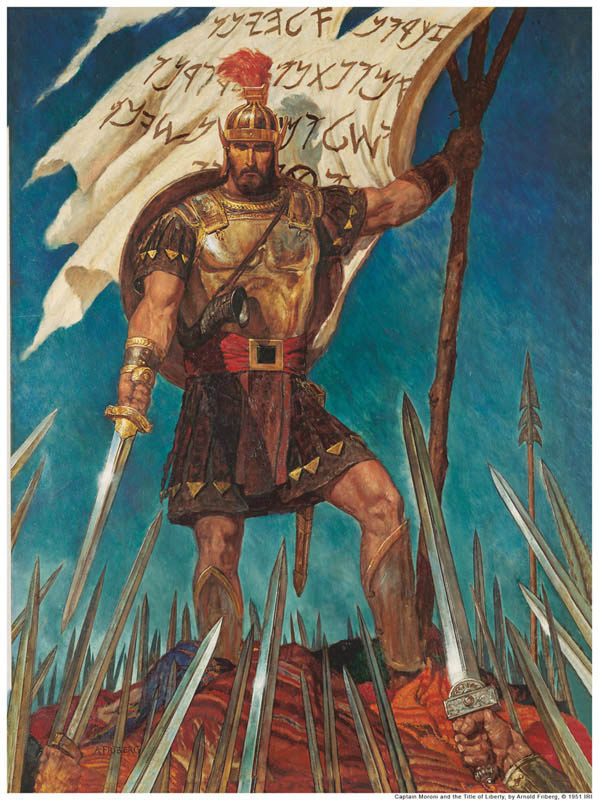Zerahemnah
Zerahemnah was a Lamanite commander around 74 B.C., in the eighteenth year of the reign of the judges, first appearing in the Book of Mormon record in Alma 43:5.
Contents
Preparations for War
The Nephites
The Nephites saw the Lamanites were coming upon them so they made ready for war, placing their armies in Jershon.Their chief captain of all the armies was Moroni who equipped his men with breastplates, arm-shields, head-shields, and thick clothing.
The Lamanites
The Lamanites massed by the thousands at Antionum, the land of the Zoramites. Zerahemnah made Amalekites and Zoramites, for they were the more murderous, chief captains over the Lamanites.
Objectives
The Nephites
The Nephites wanted to:
- Defend their lands, homes, wives and children.
- Preserve their rights and privileges.
- Keep their liberty to worship the true and living God.
- Protect the Anti-Nephi-Lehis.
The Lamanites
Zerahemnah wanted to get the Lamanites angry with the Nephites so that:
- He could have power over the Lamanites.
- He could overpower the Nephites and make them slaves.
- He could stop their worship of God and their faith in Christ.
Initial Encounter
The armies met at the borders of Jershon, the Lamanites having the superior numbers.
The Lamanites
The Lamanites were frightened at the sight of the armored Nephites. The Lamanites dared not take on the Nephites so they left Antionum, going into the wilderness by the head of the river Sidon to get to Manti. They thought that Moroni would not know where they had gone and would be able to take Manti.
The Nephites
The Lord told Alma the Lamanites were marching into the land of Manti and messengers reached Moroni with the information. Moroni left part of his force to protect Jershon. At Manti, Moroni organized the people to defend against the Lamanites. He took his army and hid them in the valley by the west bank of the river Sidon. His spies found which route the Lamanites were taking, so he divided his army and concealed a part on the east of the valley, under the command of Lehi, south of the hill Riplah.
Moroni considered it no sin to defend by statagem when the Nephites were fighting against death or slavery and for their lands, liberty, and church.
Ambush and Battle
The Lamanites passed the hill Riplah, entered the valley, and began crossing the water to reach the west bank. Lehi fought with the Lamanites from the east bank. The Nephites were protected with armor and occasionally a man would faint through loss of blood whereas the Lamanites were exposed and death came with almost every blow. The Lamanites became frightened and fled to the west bank where Moroni and his army began to slay them. The Lamanites tried to retreat to Manti but again were met by the armies of Moroni. The Lamanites now fought with great strength and courage, inspired by their Amalekite and Zoramite leaders, and by Zerahemnah. Nephite armor was pierced, and the fierceness and anger of the Lamanites brought the Nephites to the verge of retreat.
Nephite Victory
Moroni, perceiving the intent of his men, inspired their hearts with thoughts of their lands, liberty, and freedom from slavery. The men cried with one voice to the Lord their God and the same hour withstood with power against the Lamanites. The Lamanites, though more than double the number of the Nephites fled to the west bank of the river Sidon. Terror struck the Lamanites when they saw they were trapped on the west by Moroni, and on the east by Lehi.
Moroni commanded a halt to the killing. He conversed with Zerahemnah, telling him:
“Now ye see that this is the true faith of God; yea, ye see that God will support, and keep, and preserve us, so long as we are faithful unto him, and unto our faith, and our religion; and never will the Lord suffer that we shall be destroyed except we should fall into transgression and deny our faith.”[1]
A Covenant of Peace
Moroni commanded that the Lamanites give up their weapons and take an oath that they would not attack the Nephites again. In exchange his army would not slay them. Zerahemnah said he would give up his weapons but would “not suffer ourselves to take an oath unto you, which we know that we shall break, and also our children.” Zerahemnah did not believe that God had given the victory and attributed it to strategy and armor. Moroni could not recall his words and prepared to order the slaughter of the Lamanites. Zerahemnah became angry and rushed Moroni with his sword. One of Moroni's soldiers smote it to the ground where it broke at the hilt and he took off Zerahemnah's scalp. Zarahemnah withdrew. When the scalp was held high at the point of a sword and shown to the Lamanites, many entered into a covenant of peace and were allowed to leave.
Zerahemnah was extremely angry and worked up his remaining army to fight. Moroni was angry because of their stubbornness and commanded his army to kill the Lamanites. As a great slaughter ensued, Zerahemnah begged for mercy and agreed to the covenant of peace.
Conclusion
Because of the high causalities on both sides, the dead were not numbered. The bodies were thrown into the river Sidon and were carried to the sea. Moroni's army returned to their lands and homes, their objective accomplished. The Book of Mormon does not record the fate Zerahemnah.
